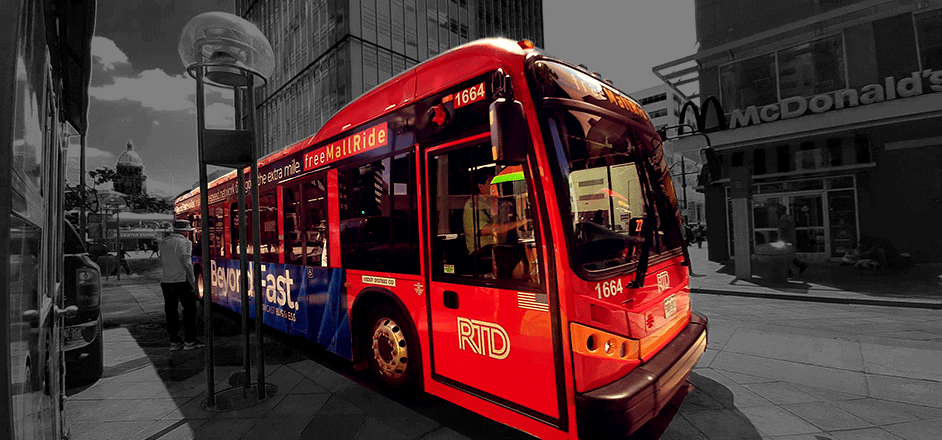Denver’s Regional Transportation District (RTD) has had a rough go of things lately on a lot of different fronts. And if they don’t get the kinks worked out soon they could be facing the axe, according to some Colorado representatives.
Just to lay out the problem: RTD’s operators, sick of being overworked, underpaid and treated like crap by both their riders and managers, have been quitting in droves since October. The rail operators have a turnover rate of 93-percent (and for bus drivers it isn’t much better, at 66-percent). Just recently RTD announced that they would be cutting six different bus lines entirely, because of their shortage of drivers, forcing many in the city to modify their entire day schedules or ditch public transportation altogether. On top of all their employee unrest, RTD’s trains have actually caught fire several times over the past few months, while full of passengers.
And, the kicker: despite all this, RTD bus and train tickets are still the most expensive public transportation tickets anywhere in the country. (Yet, somehow, in order to balance their books for 2020, RTD still had to make $40 million in last minute budget cuts.)
 Image credit of Streetsblog.
Image credit of Streetsblog.
Naturally, this has caused RTD ridership to decrease dramatically and they’re scrambling for solutions.
“RTD is in crisis,” admitted Angie Rivera-Malpiede, a member of RTD’s board of directors at a board meeting in December.
In crisis, indeed. It’s a shit show out there: People all over Denver are waiting for busses that show up late or trains that never show up at all, and the frustration is mounting. Denverites are taking to the web, to Facebook and Reddit and Twitter to voice their discontent.
“I hope something gives and results in improvement,” said Reddit user rcdemsky. “I used to be able to rely on RTD for commuting but now can only trust it to leave me stranded halfway to work, if they ever show up at all.”
“It's one of the most expensive public transit systems in the world, and the most expensive in the country. Which would be fine if our public transportation was as good as, say, Japan. But instead it's rife with late departures/arrivals, canceled routes, and the routes themselves aren't even that convenient.” Another Reddit user, TheFoxKing5 chimed in.
This level of dissatisfaction is pretty widespread. Which, RTD’s board of directors and Colorado’s state representatives have started to realize. They are recognizing just how shoddy (and expensive) Denver’s public transportation system is, and they want something done about it.
"People email us and they call us,” state Representative Tracy Kraft-Tharp, told Rivera-Malpiede and the rest of the RTD board of directors during the December board meeting. “They are unhappy because they went to the bus station and their bus didn't come. And they're hearing that their service is being cut. And so, if you don't come to us with a solution, legislators will come up with the solution."
“And you won’t like it,” said Senator Rachel Zenzinger, ominously. Adding that there has been discussion of simply ending the RTD program altogether.
But, RTD says, they are working on the problem. Back in October they launched “Re-imagine RTD,” a process which aims to tighten up all the loose nuts and bolts that have made the system so unreliable. It’s an effort to reorganize their bus routes (potentially downsizing their 2,342 square mile service area) and to create partnerships with companies like Uber and Lyft, in order to make the system more efficient.
However, so far, three months in, there hasn’t been much (if any) noticeable improvement. Since the official start of Re-Imagine RTD at the beginning of October, Denver’s public transportation has had some of its roughest months.
For a city that’s as progressive and environmentally conscious as Denver professes to be, one might imagine that the public transportation system would be a high priority for the City. After all, Denver’s air-quality was recently lowered to “Serious” by the EPA — an issue that Denver has been struggling with for the last 15 years. An issue that could be addressed directly by implementing a highly efficient, well-thought-out, well-funded public transportation system.
But, time and again over the last few years, RTD has fallen short of the mark, forcing people away from public busses and trains and into their cars, or into rideshares. It’s simple economics: when the [convenience] cost of riding the bus outweighs the cost of gas or rideshare, people will switch away from public transportation.
“I Uber to and from work now,” said Reddit user Liquidmotion. “It's about 3 times as expensive but it saves me an hour there and an hour back. My apartment is 15 minutes from my job. Fuck you RTD.”
We reached out to RTD for comment on this story, but when they at last returned our phone calls it was three hours after the window of time we’d set up with them. We rescheduled, but did not ever hear back.
Clearly someone at RTD needs to get their shit together. The system is in disarray. And if people can’t rely on public transportation to get them where they need to go on time, they won’t use it. If it’s unpredictable, plagued by cancelled routes and late arrivals, and constantly changing what routes are available, it’s not a useful way to spend public resources.
So, there are two options: fix RTD, really invest in solving the problems, greasing the wheels and fine-tuning the system so that it actually works; so that it’s reliable and so that there’s incentive for people to use it.
Or, alternatively, scrap RTD entirely and start putting together a new system — a public transportation network that actually works like The People of Denver deserve.
Which route the City of Denver ends up taking, remains to be seen. But the next few months will likely be what decides RTD’s fate. No pressure, guys.



Leave a Reply
You must be logged in to post a comment.